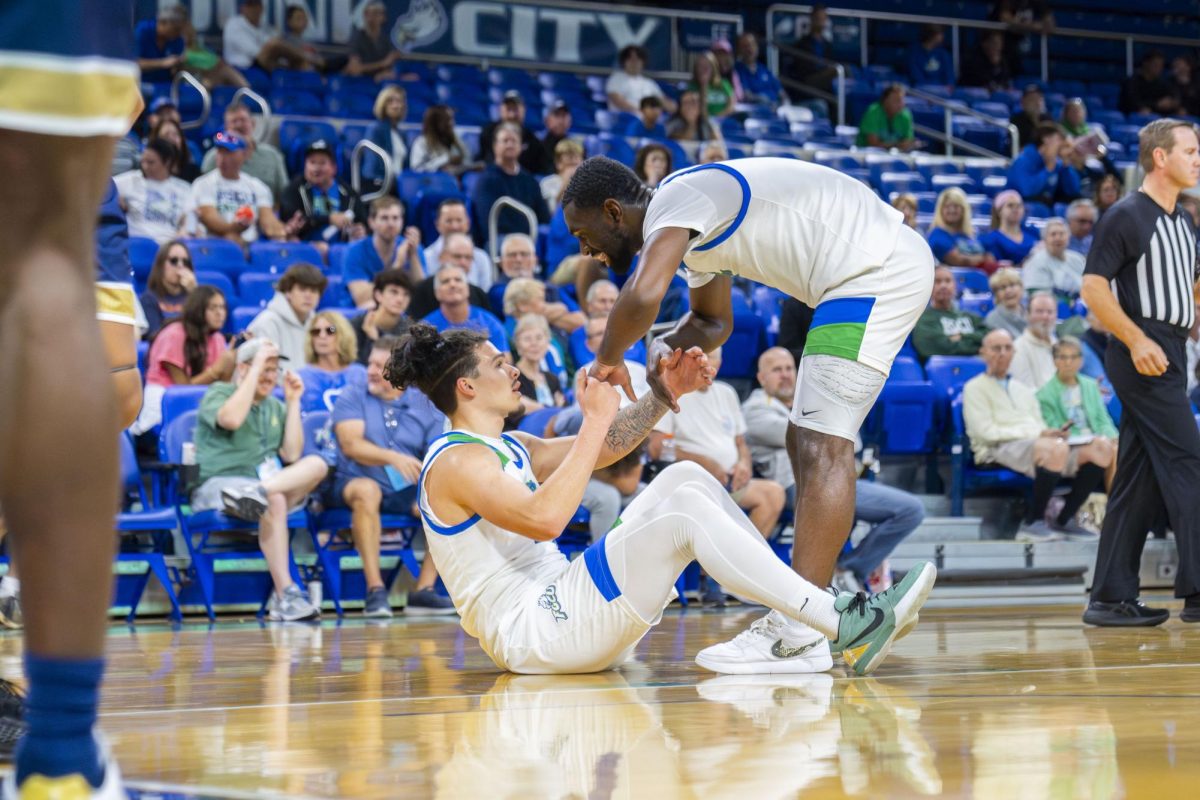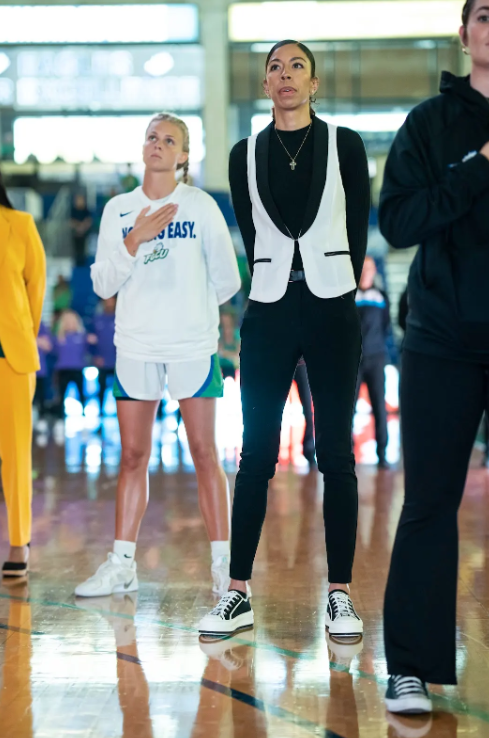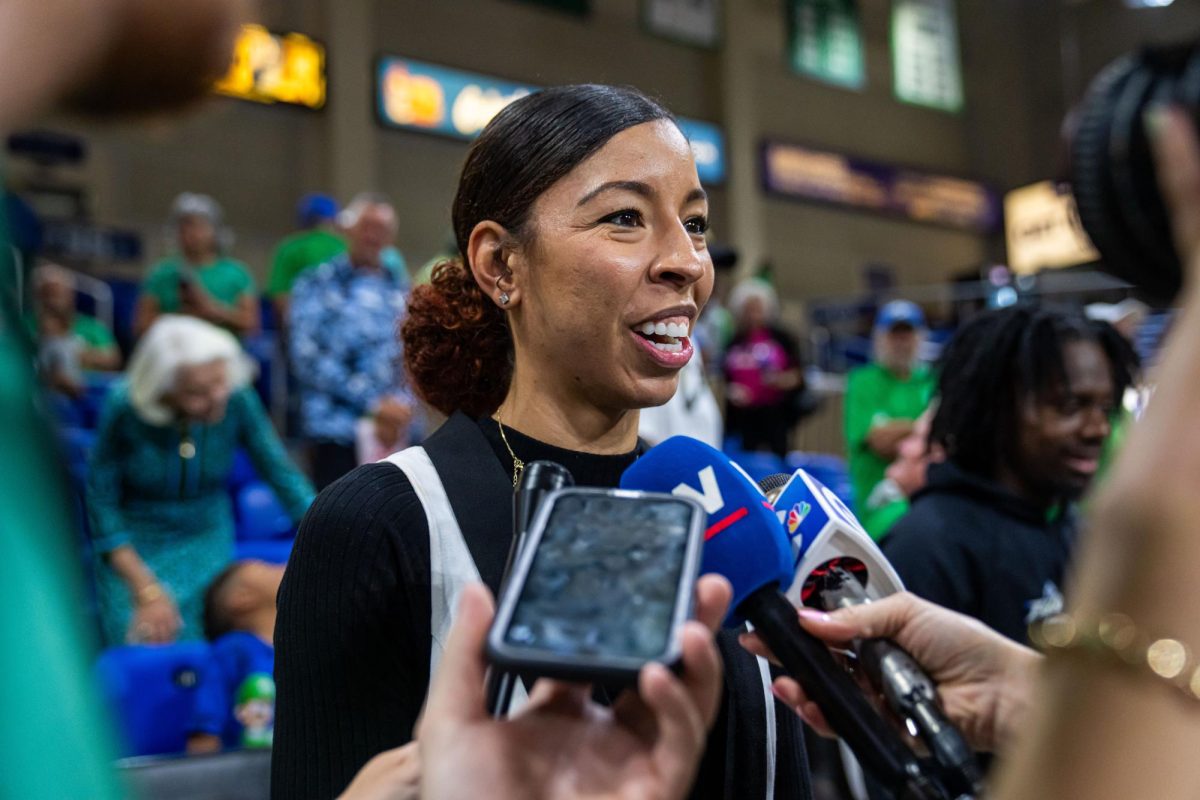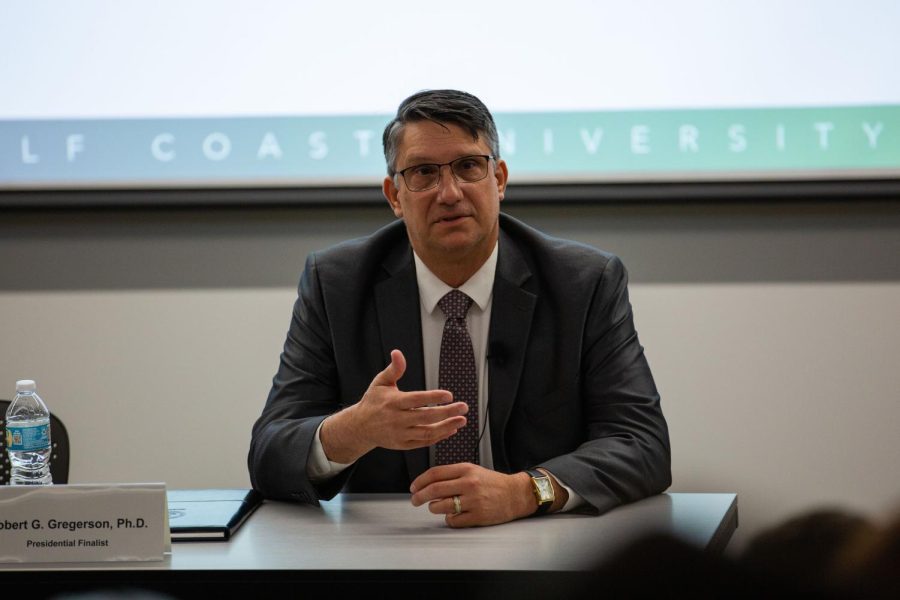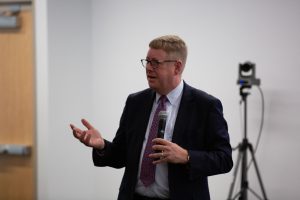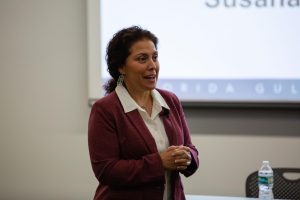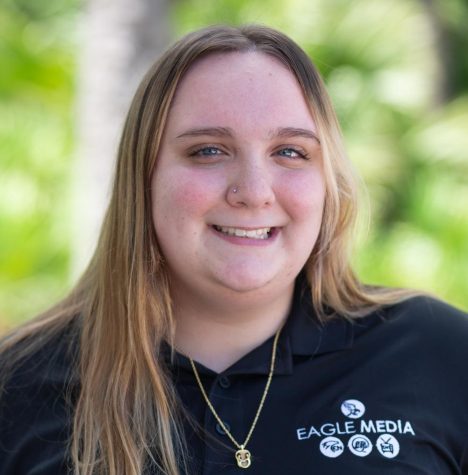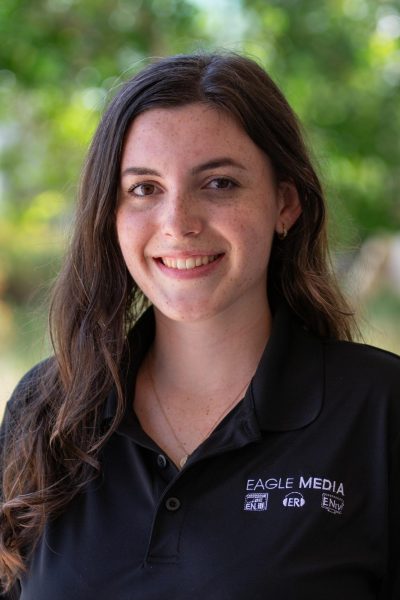Presidential Finalist Bob Gregerson Responds to Faculty Concerns
Presidential Search Finalist Robert Gregerson answers faculty’s questions at the second presidential forum.
October 31, 2022
Dr. Robert “Bob” Gregerson attended three public forums held in the Water School on Oct. 31 as a presidential finalist to answer questions from the FGCU community. The 8:30 a.m. to 9:30 a.m. forum included faculty and staff members asking questions about current FGCU challenges, to see how Gregerson would respond if he were to be the successful presidential finalist.
Faculty Senate Vice President Dr. Lyndsay Rhodes moderated the public forum and introduced Gregerson. He began by giving condolences to those personally affected or close to people impacted by Hurricane Ian. He segued into his presidential experience as the president of the University of Pittsburgh at Greensburg and he wanted to jump on this opportunity.
“I have been here, I know the institution, but a lot of things have happened in the meantime,” Gregerson said. “…I think that the dedication to students’ success, the relationships among faculty, staff, and students, those things won’t change the focus on why we’re here collectively and I would love to be a part of that again.”
Dr. Carolynne Gischel, FGCU’s chapter president for the United Faculty of Florida, asked the first question. Gischel explained that the Board of Trustees ratified a new contract that many faculty members weren’t pleased with because of the salary increase. She said that in the last three years, faculty have received a zero percent increase, zero percent increase, and then 2.5 percent increase. With the housing costs of Southwest Florida rising to nearly 35 percent, Gischel said faculty need to be compensated to remain here.
“What specifically would you do to ensure, to the best of your ability, that we can compensate faculty and all FGCU employees at a fair rate, at an adequate rate, that will allow them to continue to live here in Southwest Florida,” Gischel said.
Gregerson agreed that it’s a serious issue and that it needs to be bargained in good faith. He believes having a good relationship with faculty is essential to run a university.
“I will tell you in Pennsylvania, we were in pretty much the exact same position. We did a zero, 0.5 and then 3.25 [increase], so a little bit better, but not a whole lot,” Gregerson said. “…I think treating people fairly, having open, honest dialogue is the key. And then when the decisions are made, explaining them thoroughly so everybody understands that.”
Dr. Lisa Johnson, the associate vice president for enrollment management, asked what initial changes he made when becoming the president at the University of Pittsburgh, and how long it took for him to assess the environment and determine what changes were necessary for the faculty, staff and students to be successful.
Gregerson said he made personnel changes and modifications to duties after his “listening tour.”
“When you start an awful lot of the first several months is listening to people,” Gregerson. “Sometimes people call it a listening tour, but you make sure you listen a lot more than you talk so you get to know who the people are, what their strengths are, how they operate, where they perceive concerns and weaknesses to be…”
Gregerson shared how he attended University of Pittsburgh admission tours to see what the university was telling prospective students and their parents.
“One of the first things I did was on those summer visits, I was the guy in the crowd. Not quite anonymous, but again, I think it’s all about improving performance,” Gregerson said.
The next question came from the live stream, stating that after being at FGCU since it opened, they have witnessed administration who listen and who pretend to listen to faculty members when a decision has already been made. They asked how Gregerson would position himself on the spectrum and how he would address conflicting input from the FGCU Board of Trustees and the faculty senate.
Gregerson said he started as an assistant professor and moved up to the administrative role. He has participated in shared governance in many different ways and values empathetic listening to faculty and making sure their needs are considered during decision-making.
“I like to think of it as shared responsibility, as well, not just shared governance, but every individual, every group, has a responsibility to the institution and its students so shared governance is important to me, it’s unique to higher education,” Gregerson said. “… We’re never gonna have a situation where everybody’s content at once. That’s a fact of life, because universities are built out of human beings.”
An emailed question was announced next. They stated Gregerson’s cover letter states he has a relaxed leadership style that puts others at ease.
“University presidents have increasing political and complex jobs. How do you make highly difficult and unpopular decisions but cannot please everyone while maintaining a relaxed style. How do you communicate controversial, divisive decisions, while putting others who may strongly disagree with you at ease? In short, how do you deal with serious conflict that has no easy resolution?”
Impressed that someone read his cover letter, Gregerson began explaining that it’s a president’s duty to explain why big decisions are made to everyone involved.
“I do have a relaxed style. I do like to inject humor, and an empathetic approach to listening and understanding people’s points of view,” Gregerson said. “I think when you make a difficult decision, you have to explain why. You can’t just say, here’s what we’re doing, we’re going forward, everybody get in the line because some of those people are going to have either hurt feelings or they’re disgruntled, they didn’t agree with the decision. You just have to explain why the decision is in the best interest of the university, its students and its employees.”
Alexandra Pipitone, the director for TRIO student support services STEM, asked about Gregerson’s knowledge and experiences that would relate or contribute to FGCU as it moves from a Hispanic-enrolling institution to a Hispanic-serving institution.
Gregerson said he’s personally never worked at an HSI but knows the parameters and that’s something FGCU would strive for. He stated that HSI’s unlock federal funding that can be used to support programming to support students.
“We all know, I think, that the term Hispanic is an umbrella for a lot of diverse types of communities, so the support that one type of individual or one type of group needs might be very different from the types of support systems that other types of individuals and groups need,” Gregerson said. “So, I think moving to becoming a HSI is going to be in FGCU’s future, almost certainly… and again, recognizing that it’s a diverse group. It’s not a one size fits all approach to supporting those students.”
An unnamed professor asked how Gregerson would facilitate the best possible university-wide communication.
“I think my current situation is different than this one, obviously, smaller institution, where I literally walk the sidewalks and talk to people. Frequently, I think a president can either sort of be an imperial president and sit in the office and think great thoughts,” Gregerson said, making the audience laugh. “You got to do that sometimes, or meet frequently with groups, with individuals.”
He began by explaining that he’s seen different approaches to communication as a faculty member and an administrator from presidents.
“My judgment, I think meeting regularly with not just your cabinet but with other bodies is important. Not once a year I meet with the president of this organization, or once a semester, I meet with the dean’s sort of thing. I think you have to have regular interactions with people across campus,” Gregerson said. “…But some of that has to be scheduled, you got to make the time in the schedule to say ‘I’m going to meet with this group, I’m going to meet with that group and actually listen to what they have to say’ and maybe, in hope, they listen in the other direction as well.”
An unnamed professor in the audience brought up that many people have had to leave FGCU since Gregerson’s time at FGCU due to Hurricane Irma, the pandemic and now Hurricane Ian and President Martin guided them out of.
“How would you rebuild the community? And how would you use the strategic planning process that we’re involved in?” he said.
“I think my strengths [are] building relationships, listening to people, understanding their needs. I use the word empathy a lot. That just means I’m not just hearing your words; I’m trying to understand from your perspective what you’re saying and why you’re saying it. So that goes with every individual that’s associated with [the] university that plays a role whether it’s someone in the community that’s sort of been a supporter, the university over time, maybe it’s developing a new relationship with someone who wants to support the university, faculty, staff, students,” Gregerson said.
He believes the strategic plan for a university that’s been around for 25 years needs to look farther into the future than five years.
“I’ve been involved in lots of strategic planning processes, some of them work well, some of them don’t work so well. Has to take into account not just what are we going to be 2, 3, 4 years from now. What do we want to be far into the future? That’s harder to envision,” Gregerson said. “I think it’s getting all the stakeholders voices in the room and inputting into the committee to take account of not just where you believe you’re going to be, but what’s the current context that we all operate under. Performance funding is going to be there. I don’t think that will ever go away. So, we have to operate knowing that’s the context that we built budgets around.”
Brenda Thomas, the colloquium director, mentioned that there have been conversations about changing the university colloquium and service-learning, a key part of FGCU that makes it distinct from others.
“How do you balance maintaining the uniqueness and the things that draw a lot of faculty, staff and students here, while at the same time allowing the university to grow in the ways that it has because that’s not always an easy thing to do,” Thomas asked. “So how do you maintain the university’s uniqueness, while at the same time allowing it to grow?”
Gregerson said FGCU’s sustainability is something to be proud of. He said that three years ago, he went to a conference and learned that University of Notre Dame alumni say service-learning and community engagement were what impacted their learning the most.
“You can always evaluate, assess, get better at that provide different types of opportunities,” Gregerson said.
He referred to the nonprofit organization, Hunting For a Cure, that was created out of Professor Courtney Dwyer-Satkoski’s civic engagement course.
An online question began by saying the university has focused on niche programs that exclude a large majority of the university in order to achieve a modest increase of about 2 percent in state funding.
“This has led to a lack of focus on a majority of the faculty and a narrowing of our status as a comprehensive university. Do you value a comprehensive university, or do you think a narrower focus is preferred for a university like FGCU?” read the question.
Gregerson was unsure what niche programs the questioner was referring to.
“I don’t think it’s a bad thing to have niche programs that appeal to certain groups that provide publicity for the university and provide opportunities that wouldn’t exist otherwise. So again, I don’t know the specifics. You have to focus on the bread and butter and the blocking and tackling of being a university and I think this university has that,” Gregerson said. “…But I would say that in some cases, you might want to have some small programs that are highly visible, that make an impact, but you can’t lose sight of what you are as a university and how you’re trying to serve a broad swath of students.”
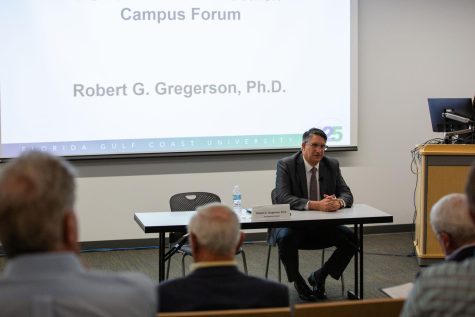
The next online question asked what ideas he has supporting improvement in performance funding metrics.
“I would just advocate for continually [assessing] what we’re doing, how we’re doing it, why we’re doing it, and improve student outcomes. It’s a hard thing, if you look across the country, there are lots of institutions who are, if you look at the metrics, perform better than FGCU. And there are lots of institutions that don’t perform as well as FGCU. But the ones that perform much better have completely different support structures, completely different admissions policies,” Gregerson said. “I think this institution will always need to serve the region, the state, the country, in ways that provide opportunities for a diverse array of students, and so I wouldn’t ever want to compromise that. But you just have to keep working at what’s there and find things that that you believe will work and assess whether they did work.”
Another online question asked his view of the liberal arts in a climate that’s centralized around STEM and professional colleges. He responded that having an array of majors to accommodate student needs.
“You want opportunities for them to learn, to develop skills that they can apply, we tend to call those transferable skills,” Gregerson said. “…You don’t exclude one type of program by focusing on another, you focus on things that are more directly career-focused and things that students really enjoy, really do well at, really engage with, and really learn those transferable skills, so I think that’s really important.”
He mentioned that many students will change their career path throughout their life, and these transferable skills will prepare them. He established the PAGES program with Glenn Whitehouse and others before he left for the University of Pittsburgh.
Ashleigh Droz, the director of the Office of Internships and Cooperative Programs, asked to hear his philosophy about student learning outside of the classroom, particularly experiential learning like internships and career readiness initiatives.
“As many opportunities as you can provide for students to learn outside the classroom is important. The statistics show that students who do internships have a leg up on students who don’t,” Gregerson said. “…The more of these opportunities they get, the more career ready they will be when they walk across that stage and commencement.”
He talked about how many interns get offered jobs after graduation by the relationships they form. He said that learning inside and outside of the classroom mutually supports each other.
Rose Fuller, the director of Career Development Services, asked what percentage of his time will be spent building relationships with local employers.
“I think it will be 17.3 percent,” Gregerson joked. “A substantial amount… part of that listening tour piece is going to be off campus, as well as the part that’s going to be on campus.”
He said this isn’t just the president’s job. Many people are a part of the process to create, grow, and reestablish community connections. This includes going further into the community than directly outside of FGCU.
An unnamed instructor in the Department of Communication and Philosophy asked what he would do beyond salary to produce a positive work culture for faculty.
“You want to make sure the benefits packages are supportive of everyone, not just faculty, but the faculty and staff. So that’s important, benefits are just as important as salary or at least close to that,” Gregerson said. “But I think it’s monitoring what people are doing, making sure the department chair is supporting them in terms of what they’re doing beyond their class assignments, making sure there’s release time for things that are really very, very time-consuming.”
He referred to the question regarding housing costs.
“Maybe there’s some options there and some opportunities to provide some sort of support in that area. It might be for a defined period of time, a couple of years, three years, something like that. I don’t know, it could be longer, but FGCU has very good relationships with a lot of area banks and bankers and developers. So, there might be some opportunity to take some burden off of people that way. I don’t know. I’ve just thought about that in the abstract,” Gregerson said.
Former FGCU trustee Dr. Shawn Felton spoke next.
“When Dr. Martin became president, he recognized that the FGCU underserved the Southwest Florida agricultural community, four years ago, established the Center of Agribusiness before the store Advisory Committee of Farming Agricultural Laborers, and recruited a faculty to develop this course. The academic program now includes non-agribusiness classes and attracts more than 100 students per year. As president, how would you expand on Dr. Martin’s legacy?”
Gregerson said that FGCU is not a land-grant university, meaning, FGCU isn’t a university that receives federal land and the benefits of the Morrill Acts of 1862, 1890, and 1994.
“If you’re going to reflect the environment that you’re in, the region that you’re in, there’s an awful lot of agriculture that supports the economy in this region. So, I think you have to do things that make sense that build off what’s already here. And some of that is the programs that you just mentioned, but some of it is other programs that exist,” Gregerson said.
Dr. Jaffar Ali Shahul Hameed, a mathematics professor, finished off the forum. He asked what Gregerson saw for FGCU as an educational institution in five years.
“I think, if I have the numbers, right, it’s about 15,000 undergraduates and 1000 graduate students approximately and that’s that ratio has been about the same the whole time I was here as well. [FGCU has] added some new graduate programs and I think they’re possible for continued growth in that area. There may be a possibility of doctoral programs down the road,” Gregerson said.
He believes there’s opportunity for growth at the graduate and undergraduate level.
“So, I do see growth in [the] number of students, that means growth in faculty and staff. And then probably we mean some growth in types of programs that we haven’t had before,” Gregerson said.
Hameed also wanted to know Gregerson’s viewpoint on academic freedom.
“I believe in freedom of expression, it’s important that everyone feels comfortable expressing their views and that faculty have the ability in their classes to teach their content and sometimes its content can be controversial, sometimes, it can make people uncomfortable,” Gregerson said.
Gregerson explained the statement that the University of Chicago released about freedom of expression. It mentions how you’re not supposed to be comfortable in college, you’re supposed to learn how to think.
“If you can’t grapple with difficult issues in college, where the heck can you? You know? So, yeah, academic freedom is important. It’s critical,” Gregerson said. “There’s lots of reasons why, over the last 50, 60 years, people from around the world have flocked to universities in the United States. All over the world, people come to the United States because we built a university model in this country, that is second to none, that provides people with the opportunity to learn in lots of different areas, in lots of different ways, and explore lots of interesting sometimes controversial issues.”
Gregerson ended the forum by thanking everyone for coming to the public forum.







